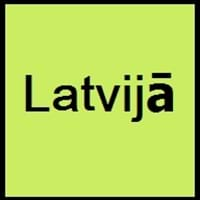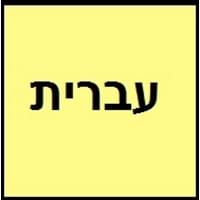Latvian and Hebrew
Countries
European Union, Latvia
Israel
National Language
Latvia
Israel
Second Language
Not spoken in any of the countries
Israel
Speaking Continents
Europe
Africa, Asia, Europe
Minority Language
Not spoken in any of the countries
Poland
Regulated By
Latvian State Language Center
Academy of the Hebrew Language
Interesting Facts
- The first written form of Latvian dates from 16th century was found in religious texts.
- The old latvian language was based on the a Gothic script.
- The original language of Bible is Hebrew.
- The men and women use different verbs in hebrew language.
Similar To
Lithuanian Language
Arabic and Aramaic languages
Derived From
Not Available
Aramaic Language
Alphabets in
Latvian-Alphabets.jpg#200
Hebrew-Alphabets.jpg#200
Writing Direction
Left-To-Right, Horizontal
Right-To-Left, Horizontal
Hello
Sveiki
שלום (Shalom)
Thank You
Paldies
תודה (Toda)
How Are You?
Kā jums klājas?
מה שלומך? (ma shlomxa)
Good Night
Ar labunakti
לילה טוב (Laila tov)
Good Evening
Labvakar
ערב טוב (Erev tov)
Good Afternoon
Labdien
אחר צהריים טובים (Achar tzahara'im tovim)
Good Morning
Labrīt
בוקר טוב (Boker tov)
Please
lūdzu
בבקשה (bevekshah)
Sorry
Piedodiet!
סליחה! (Slicha)
Bye
Uz redzēšanos
להתראות (Lehitraot)
I Love You
Es tevi mīlu
אני אוהבת אותך (Ani ohevet otcha)
Excuse Me
Piedodiet!
בבקשה!
Dialect 1
Livonian
Ashkenazi Hebrew
Where They Speak
Latvia
Israel
Dialect 2
Middle Latvian
Samaritan Hebrew
Where They Speak
Latvia
Israel, Palestine
Dialect 3
High Latvian
Yemenite Hebrew
Where They Speak
France, Latvia
Israel
Speaking Population
Not Available
Not Available
Second Language Speakers
Not Available
Native Name
latviešu valoda
עברית / עִבְרִית (ivrit)
Alternative Names
Lettish
Israeli, Ivrit
French Name
letton
hébreu
German Name
Lettisch
Hebräisch
Pronunciation
Not Available
[(ʔ)ivˈʁit] - [(ʔ)ivˈɾit]
Ethnicity
Latvians or Letts
Not Available
Language Family
Indo-European Family
Afro-Asiatic Family
Branch
Not Available
Canaanitic
Early Forms
No early forms
Biblical Hebrew, Mishnaic Hebrew, Medieval Hebrew, Hebrew
Standard Forms
Latvian
Modern Hebrew
Language Position
Not Available
Signed Forms
Latvian Sign Language
Signed Hebrew
Scope
Macrolanguage
Individual
ISO 639 6
not Available
Not Available
Glottocode
latv1249
hebr1246
Linguasphere
54-AAB-a
12-AAB-a
Language Type
Living
Living
Language Linguistic Typology
Subject-Verb-Object
Subject-Verb-Object, Verb-Subject-Object
Language Morphological Typology
Synthetic
Fusional, Synthetic
All Latvian and Hebrew Dialects
Most languages have dialects where each dialect differ from other dialect with respect to grammar and vocabulary. Here you will get to know all Latvian and Hebrew dialects. Various dialects of Latvian and Hebrew language differ in their pronunciations and words. Dialects of Latvian are spoken in different Latvian Speaking Countries whereas Hebrew Dialects are spoken in different Hebrew speaking countries. Also the number of people speaking Latvian vs Hebrew Dialects varies from few thousands to many millions. Some of the Latvian dialects include: Livonian, Middle Latvian. Hebrew dialects include: Ashkenazi Hebrew , Samaritan Hebrew. Also learn about dialects in South American Languages and North American Languages.
Latvian and Hebrew Speaking population
Latvian and Hebrew speaking population is one of the factors based on which Latvian and Hebrew languages can be compared. The total count of Latvian and Hebrew Speaking population in percentage is also given. The percentage of people speaking Latvian language is Not Available whereas the percentage of people speaking Hebrew language is Not Available. When we compare the speaking population of any two languages we get to know which of two languages is more popular. Find more details about how many people speak Latvian and Hebrew on Latvian vs Hebrew where you will get native speakers, speaking population in percentage and native names.
Latvian and Hebrew Language Codes
Latvian and Hebrew language codes are used in those applications where using language names are tedious. Latvian and Hebrew Language Codes include all the international language codes, glottocodes and linguasphere.





